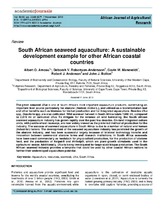| dc.contributor.author | Amosu, Albert O. | |
| dc.contributor.author | Robertson-Andersson, Deborah | |
| dc.contributor.author | Maneveldt, Gavin | |
| dc.contributor.author | Anderson, Robert J. | |
| dc.contributor.author | Bolton, John J. | |
| dc.date.accessioned | 2016-06-08T12:16:58Z | |
| dc.date.available | 2016-06-08T12:16:58Z | |
| dc.date.issued | 2013 | |
| dc.identifier.citation | Amosu, A.O. et al. (2013). South African seaweed aquaculture: A sustainable development example for other African coastal countries. African Journal of Agricultural
Research, 8(43): 5268 - 5279 | en_US |
| dc.identifier.issn | 1991-637X | |
| dc.identifier.uri | http://hdl.handle.net/10566/2292 | |
| dc.identifier.uri | http:dx.doi.org/10.5897/AJAR2013. 6994 | |
| dc.description.abstract | The green seaweed Ulva is one of South Africa's most important aquaculture products, constituting an
important feed source particularly for abalone (Haliotis midae L.), and utilized as a bioremediation tool
and other benefits such as biomass for biofuel production and for integrated aquaculture. Besides Ulva
spp, Gracilaria spp. are also cultivated. Wild seaweed harvest in South Africa totals 7,602 mt, compared
to 2,015 mt of cultivated Ulva. To mitigate for the reliance on wild harvesting, the South African
seaweed aquaculture industry has grown rapidly over the past few decades. On-land integrated culture
units, with paddle-wheel raceways, are now widely viewed as the preferred method of production for the
industry. The success of seaweed aquaculture in South Africa is due to a number of natural and human
(industrial) factors. The development of the seaweed aquaculture industry has paralleled the growth of
the abalone industry, and has been successful largely because of bilateral technology transfer and
innovation between commercial abalone farms and research institutions. In South Africa seaweeds
have been used commercially as feedstock for phycocolloid production, for the production of abalone
feed, and the production of Kelpak and Afrikelp, which are plant-growth stimulants used in the
agricultural sector. Additionally, Ulva is being investigated for large-scale biogas production. The South
African seaweed industry provides a template that could be used by other coastal African nations to
further their undeveloped aquaculture potential. | en_US |
| dc.language.iso | en | en_US |
| dc.publisher | Academic Journals | en_US |
| dc.rights.uri | All articles published by Academic Journals are licensed under the Creative Commons Attribution 4.0 International License. This permits anyone to copy, redistribute, remix, transmit and adapt the work provided the original work and source is appropriately cited. Article available online at: http://dx.doi.org/10.5897/AJAR2013. 6994 | |
| dc.subject | Seaweed | en_US |
| dc.subject | South Africa | en_US |
| dc.subject | Africa | en_US |
| dc.subject | Aquaculture | en_US |
| dc.subject | Ulva | en_US |
| dc.title | South African seaweed aquaculture: A sustainable
development example for other African coastal
countries | en_US |
| dc.type | Article | en_US |
| dc.privacy.showsubmitter | FALSE | |
| dc.status.ispeerreviewed | TRUE | |

